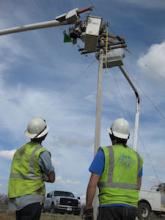
Fast, affordable Internet access for all.

On September 26th, Republican FCC Commissioners adopted an Order that usurps local control and, in keeping with this administration’s prior policy decisions, strengthens the power of the largest companies, obtaining nothing in return.
Bad Reasoning
At issue are local governments’ ability to determine the amount of fees to charge mobile carriers that want to place 5G equipment in rights-of-way. In addition to establishing fees, the Order sets strict timelines in which cities and towns must respond to carrier applications. The FCC decision eliminates local communities’ ability to negotiate in order to protect their own rights-of-way and the poles, traffic lights, and other potential structures in them.
To back up their decision to adopt the new policy, the Republican controlled FCC relied on the incorrect claims that application and attachment fees in larger communities are so excessive that they create a burden which prevents carriers from investing in rural communities. Former FCC Chief of Staff and one of the architects of the 2010 National Broadband Plan Blair Levin echoed the thoughts of policy analysts and thought leaders in telecommunications:
"[E]ven if one accepts the FCC claim about the $2.5 billion—which is highly questionable—that amount is about one percent of what the FCC and industry claim is the necessary new investment needed for next-generation network deployments and, therefore, is not likely to have a significant impact," he wrote.
The FCC does not require mobile carriers to commit to expanded coverage in smaller communities within the Order. Next Century Cities describes the situation in a press release:
These low fees would create a de facto public subsidization of industry investment. … The FCC is just giving private wireless companies all of the benefits of a utility without any traditional public interest obligations.
FCC Commissioner Jessica Rosenworcel, who has continued to oppose the Order, described the giveaway:
"Comb through the text of this decision—you will not find a single commitment made to providing more service in remote communities. Look for any statements made to Wall Street—not one wireless carrier has said that this action will result in a change in its capital expenditures in rural areas."
The Order sets application fees at $100 and $270 annual fees for each small cell. Local governments, who have firsthand knowledge of the costs, maintenance, and challenges of hosting industry equipment in the rights-of-way, oppose the FCC decision. Each community is unique and this new policy prevents them from working with mobile carriers to reach the best solution for both parties and the communities they serve.
In their statement opposing the proposal, the National League of Cities wrote:
“Today’s vote, however, overlooks significant concerns from the nation’s cities and counties. Over 100 local governments from 22 states filed comments in opposition to the proposed ruling during the FCC’s comment period.
...
“Local governments share the FCC’s urgency; however, this ruling promises to force local governments to rubber-stamp small cell applications or face crippling legal recourse from providers racing to corner the 5G communications market."
It's Not All About Money
In addition to the limits on fees, the Order interferes in the public safety and aesthetic requirements communities can require for small cells, imposing a reasonableness requirement. The Order sheds little light on the “reasonable” standard. For towns that highly value aesthetic architectural qualities — as in the case of historic downtown districts — the FCC waves away the unique needs of individual communities. Samir Saini, CIO of New York City, commented on the Order in a blog post prior to the vote:
"Without local control, multiple companies could pile many different installations on a single light pole. Imagine a mass of new equipment on a single structure, ruining streetscapes and potentially interfering with first responder, electric utility and other critical equipment."
Prior to the adoption, Next Century Cities developed a summary of the Order. Download the document to learn more about their interpretation of the Order details. Also from their press release:
“Communities across the country are working hard to encourage 5G investment,” says Deb Socia, Executive Director of Next Century Cities. “Local leaders want this technology that will improve quality of life for their constituents. However, this Order puts a foot on the scale for industry, and limits community capacity to serve the public interest. Mutually beneficial agreements will only happen when local governments can come to the table without their hands tied behind their backs.”
